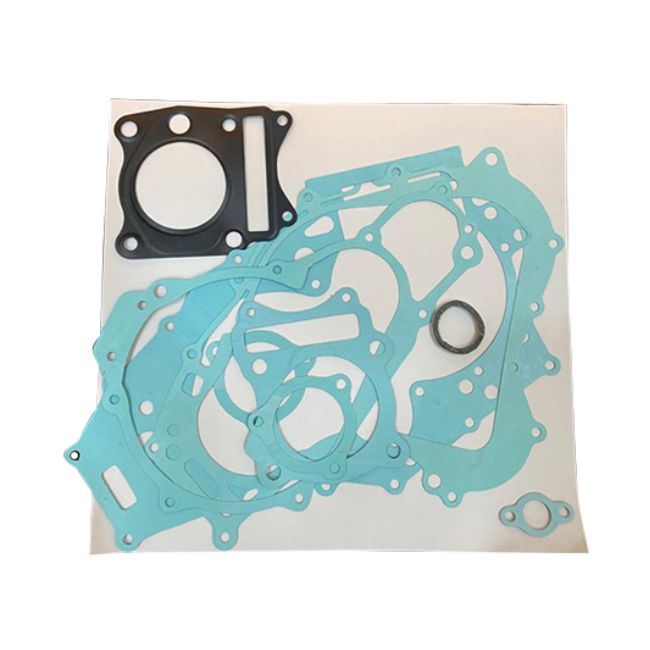When it comes to internal combustion engines, precision and sealing are everything. An engine works by compressing a mixture of air and fuel inside its cylinders, then igniting it to create the power that drives a vehicle forward. For this process to happen efficiently, every component must fit perfectly and maintain airtight and fluid-tight seals. That’s where gaskets come into play.
Although small and often overlooked, gaskets are among the most critical components of an engine. Without them, compression would be inconsistent, fluids would leak, and the engine would quickly fail. In this article, we’ll take a closer look at the role of gaskets in engine compression, how they work, and why maintaining them is essential for engine health.
Understanding Engine Compression
Before we get into the details of gaskets, it’s important to first understand what engine compression means. In a four-stroke internal combustion engine, the compression stroke occurs when the piston travels upward within the cylinder, forcing the air-fuel mixture into a tighter volume. This compression raises the pressure and temperature, preparing the mixture for efficient ignition by the spark plug.
Compression must be airtight. If there are leaks—whether from faulty seals or damaged components – the pressure drops, leading to poor combustion, power loss, rough idling, and increased fuel consumption. Maintaining this perfect seal between engine components is exactly the job gaskets are designed to do.
What Are Gaskets?
A gasket is a mechanical seal made of compressible material, designed to fit between two surfaces to prevent leakage of gases, fluids, or pressure. In engines, gaskets are usually made from multi-layer steel (MLS), graphite, composite materials, or even specialized elastomers, depending on their application.
The most critical gasket in terms of engine compression is the head gasket. It sits between the engine block and the cylinder head, ensuring that the combustion chamber is sealed off from coolant and oil passages. Other gaskets, such as intake and exhaust gaskets, valve cover gaskets, and oil pan gaskets, also play supporting roles, but the head gasket is the star when it comes to compression.
The Role of Gaskets in Engine Compression
1. Sealing the Combustion Chamber
The main function of the head gasket is to seal the combustion chamber, ensuring that the engine can achieve optimal compression during the compression stroke. Without this seal, the air-fuel mixture would escape, making combustion weak and inefficient. This directly affects horsepower, torque, and overall engine performance.
2. Maintaining Pressure Under Extreme Conditions
Combustion creates pressures exceeding 1,000 psi and temperatures above 2,500°F (1,370°C). Gaskets must withstand these harsh conditions without deforming or failing. High-performance engines often use multi-layer steel gaskets because of their strength and ability to maintain a tight seal under thermal expansion and contraction.
3. Separating Fluids and Pathways
Besides sealing the combustion chamber, the head gasket also separates oil and coolant passages that run between the block and head. A failed gasket can allow coolant to leak into the combustion chamber or oil passages, leading to overheating, oil contamination, and catastrophic engine damage. By maintaining strict separation, gaskets ensure both fluids serve their functions without interfering with compression.
4. Compensating for Surface Irregularities
No machined surface is perfectly flat. Gaskets provide a compressible layer that fills in microscopic gaps and imperfections between the block and head. This ensures that compression is uniform across all cylinders, preventing uneven power delivery and misfires.
5. Reducing Vibrations and Noise
While not their main job, gaskets also absorb some vibrations and reduce mechanical noise in the engine. By cushioning the connection between surfaces, they contribute to smoother operation.
What Happens When Gaskets Fail?
A blown head gasket is one of the most dreaded engine problems. When the gasket can no longer maintain compression, several issues arise:
Loss of Compression Leads to poor engine performance, misfires, and reduced fuel efficiency.
Coolant Leaks into Cylinders: Creates white exhaust smoke and can cause hydro-lock (when liquid prevents the piston from moving).
Oil Contamination: Coolant mixing with oil produces a milky residue, reducing lubrication and leading to engine wear.
Overheating: Gasket failure often disrupts coolant circulation, causing overheating that can warp the cylinder head.
These issues highlight just how crucial gaskets are to maintaining compression and overall engine reliability.
Maintaining Engine Gaskets
Although gaskets are designed to be durable, they can still deteriorate over time. Factors such as overheating, improper installation, or poor-quality materials can shorten their lifespan. To maintain healthy gaskets:
Prevent Overheating: Ensure your cooling system is well-maintained and functioning properly. Excess heat is the number one cause of gasket failure.
Use Quality Parts: Cheap gaskets often fail prematurely. Always choose OEM or high-quality aftermarket gaskets.
Ensure Proper Installation: Correct torque specifications and tightening sequences are critical for even gasket seating.
Monitor Engine Performance: Watch for signs of compression loss, smoke, overheating, or oil contamination. Early detection can prevent severe damage.
The Future of Engine Gaskets
As engines become more efficient and downsized, with higher compression ratios and turbocharging, the demands on gaskets increase. Modern gaskets use advanced materials and manufacturing techniques to handle higher pressures and temperatures while maintaining flexibility and durability. Multi-layer steel gaskets, coated with elastomeric sealing layers, are now standard in many vehicles for their superior sealing performance.
Don’t Miss: What Are the Most Common Mistakes to Avoid When Installing Gaskets?
Conclusion
Gaskets may be small and relatively inexpensive parts of an engine, but their role in engine compression is enormous. By sealing the combustion chamber, maintaining pressure, and separating vital fluids, gaskets enable engines to operate efficiently and reliably. A failed gasket can quickly turn a healthy engine into an expensive repair bill, underscoring the importance of maintenance and quality components.
The next time you think about engine performance, remember that it’s not just the pistons, valves, or spark plugs doing the heavy lifting. The humble gasket, silently holding everything together, is just as vital to the heartbeat of your engine.

